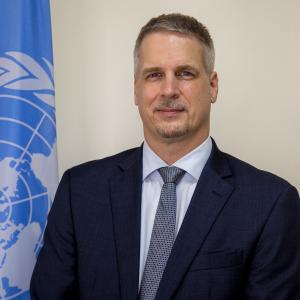It is a real pleasure to join you all today at this important Validation Workshop on Disability Inclusion in the Pacific Labour Market.
Let me begin by extending my warm thanks to the ILO and OHCHR for spearheading this assessment, and to the Pacific Disability Forum for their strong leadership and partnership throughout this journey.
Your work continues to push boundaries of inclusion, advocacy, and rights-based development across the region.
Today’s workshop is part of the broader SDG Programme titled “Advancing the SDGs by improving livelihoods and resilience via economic diversification and digital transformation.” This joint initiative has already changed lives in real and measurable ways.
Let me share just a few examples:
- Over 1,800 people – including women, youth, and persons with disabilities – have gained essential digital skills.
- In Rotuma, Fiji, and Malekula, Vanuatu, smart classrooms are enabling digital learning and creating new opportunities where access was once limited.
- More than 70 MSMEs, many led by women and young people, have received targeted support to grow, adapt, and formalize.
- And in Tonga, what began as a cookery apprenticeship has helped shape a national employment policy.
These are not just success stories – they are signals of a wider transformation, one that we can and must continue to build on.
Because when we make our labour markets more inclusive for persons with disabilities, we are not just doing the right thing – we are making a smart, strategic investment in our collective future. Inclusive employment contributes to stronger economies, greater resilience, and more cohesive societies.
This is why today matters. The assessment we are validating goes beyond numbers. It looks at the barriers that persons with disabilities face – often silently – in accessing and sustaining employment, especially in informal sectors.
And more importantly, it offers a pathway forward, with concrete, prioritized recommendations for action.
At the heart of this work is a clear promise: that everyone has the right to work in an open, inclusive, and accessible environment.
This is enshrined in the Convention on the Rights of Persons with Disabilities, which, I should note, all five countries represented here today have signed, with Tonga yet to ratify.
Our role, collectively, is to move from commitment to implementation.
And to do that, we need everyone in the room – government leaders, employers, Organizations of Persons with Disabilities (OPDs), civil society, and development partners – to help shape the way forward.
Today is not just about validating a report. It is about shaping a shared agenda. It is about ensuring that your voices, especially those of persons with disabilities, are not just heard – they drive the solutions.
Therefore, I invite you to participate actively, to challenge the status quo, and to help us chart a course that is not only inclusive but also achievable.
With only five years remaining until 2030, we must accelerate our efforts.
Disability inclusion is not a niche issue – it is a core component of sustainable development. I am confident today’s discussion will lay the groundwork for smarter policies, stronger partnerships, and more inclusive labour markets across the Pacific.
Vinaka Vakalevu, Dhanjavaad, Thank You.


